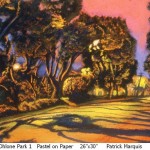ARTIST’S STATEMENT
I am a painter and I use a range of mediums including acrylic, oil, and pastel. However, color and its power to evoke emotion is the defining aspect of my art. For many years, I discovered a rich arena of color in my cityscape work. Night intrigued me the most, as artificial light from street lamps and house windows, reflecting off of overcast skies, created a surprising range of color tones. The oranges and reds created by artificial light set against the quietude of the purple and blue night sky, with a variance of color in the shadows, evoked a powerful emotional environment. Urban images revealed landscapes of desolation, loneliness, and contemplation. As I moved away from strictly representational composition, working instead in an intensive technique of layers and layers of paint applied with small strokes and a small brush, time itself began to develop as an element in the work. During the process, the image inherently evolved. As the colors combined and reacted, new patterns emerged. Rather than adhering to a preconceived pattern of color, I followed the development of the color as it occurred. Viewers have commented that my method of applying paint seemed to resemble the technique in the Pointillist paintings of Seurat, whose work was groundbreaking and anticipated modern methods of color printing. While mindful of these amazing discoveries, as an artist, I am striving to combine the qualities of color that create an intrinsic reaction in the eye, in order to construct a visual atmosphere that invites contemplation and an emotional reaction in the viewer’s imagination.
-Patrick Marquis
You can visit the artist’s Website at Patrickmarquis.com.
Contact the artist by email at ampmnow@netzero.com.




